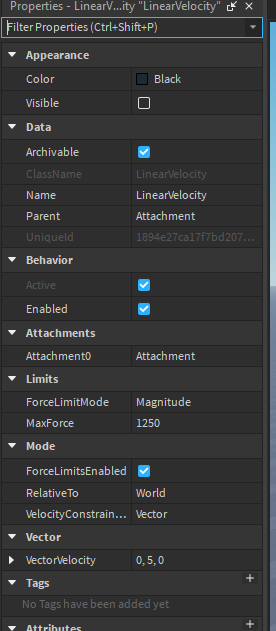Hello everyone! I am having troubles with making a hot air balloon system as I cannot figure out how to use linear velocities on the model, and have tried about everything I can think of and it still doesn’t work. I’ve tried to just use an attachment on the model itself and make a velocity, Ive tried to make a primarypart and set the model to that part, and make an attachment in that part (that didnt work). Last thing I tried was to weld contraint every single part of the balloon to the primary part and add the attachment/linear velocity to the primary part and again it didnt work. Im so confused on how to make this model move, help would be appreciated!
First make sure the whole model is unanchored, then can you send the properties of your LinearVelocity instance?
You have to weld every part to the primary part, then apply force on the primary part.
Yes read my post again I already did this…
everthing is unanchored blslalalalala
I think you did something wrong.
I made a model consisting of 3 parts, and called one “Primary” and welded the other 2 to the primary part. And inside the primary part I put an Attachment for movement for the Linear Velocity. Lastly I made everything massless so it doesn’t interact with the ground. And used this script to move it. And it works perfectly fine.
local LinearVelocity = Instance.new("LinearVelocity", script.Parent.PrimaryPart)
LinearVelocity.MaxForce = math.huge
LinearVelocity.VelocityConstraintMode = Enum.VelocityConstraintMode.Vector
LinearVelocity.VectorVelocity = Vector3.new(10, 0, 0)
LinearVelocity.Attachment0 = script.Parent.PrimaryPart.Attachment
LinearVelocity.Enabled = true

Ive done this and still it doesnt work… I changed everything to massless as well and named the primary part primary (dont know if that matters) and I put the attachment in the primary part
Can I see the script your using?
im not using a script just running the game with a linear velocity in the attachment
And everything is unanchored? I just don’t know what to tell you here.
Yeah I shift clicked every part and all of them are unanchored
May I see your Linear Velocity settings, like what mode it is, the VectorVelocity e.t.c
i know this is deprecated but try testing it with BodyVelocities instead of LinearVelocity, personally that seems to work for me better. want to apply a force in the forward facing value of a part? set the force vector to the CFrame.LookVector of the part times whatever magnitude to adjust the speed like so:
local bodyVelocity = Instance.new("BodyVelocity")
local bodyVelocityTargetMagnitude = 35
bodyVelocity.Parent = workspace.Part --example
bodyVelocity.MaxForce = math.huge
bodyVelocity.Velocity = workspace.Part.CFrame.LookVector * bodyVelocityTargetMagnitude
if you know how to work your way around CFrames, then its pretty simple. incase you were wondering, here is a sorta cheat sheet for the vectors of a CFrame (these are based upon the rotation matrix of the CFrame, which i will not force you to learn about because its weird)
-
.LookVector: forwards -
.YVectoror.UpVector: up -
.XVectoror.RightVector: right
to invert any of these i think you just have to multiply the vectors by a negative value
and p.s try doing it in a script (the bodyvelocities)
nope still didn’t work I copied ur code exactly and instead of setting maxforce u have to set it to a vector 3 but that still didnt work
ok right i forgot do
Vector3.new(math.huge, math.huge, math.huge)
for the force vector
First, #help-and-feedback:building-support
I would say, make sure the Vector Velocity is up (y axis), make sure the constraint.RelativeTo is set to Global, DON’T MAKE THE PARTS MASSLESS, and set the MaxForce really high. When I say high I mean like 1 billlion, not 1250. The video was 1 million.
robloxapp-20241202-1629538.wmv (1.2 MB)
Thanks bro i dont know what did it but it worked!!!
This topic was automatically closed 14 days after the last reply. New replies are no longer allowed.


